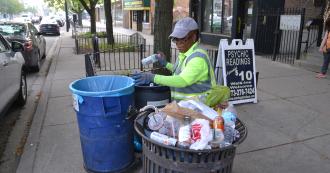It’s a muggy Wednesday morning in Chicago’s Wicker Park neighborhood, the temperature and humidity rising before the sun. Lena, decked out in her eye-catching slate shirt and chartreuse vest, leans slightly out into the busy rush-hour traffic, sweeping litter (wrappers, cups, lots of cigarette butts) from the gutter into her dustpan.
On the sidewalk, she empties her collection into a cart. As she moves down the street, cleaning curbs, sidewalks, planters, empty patios, and even under the grates around sidewalk trees, she greets the Chicagoans walking by.
Lena is an intern (read: crew member of a cleaning team) at Cleanslate, a neighborhood beautification and landscaping business. Cleanslate offers transitional employment opportunities and is operated by Cara, a nonprofit that has been working in the city since 1991.
Cara provides job training – such as resume workshops and mock interviews – and connections for people looking for work. This includes everything from jobs for felons, those dealing with domestic violence, addiction recovery, poverty, housing instability, and other missteps or misfortunes.
“You’d be Surprised by What You Find in the Cans”
The work isn’t terribly glamorous, but Cleanslate offers interns hands-on experience, a paying job, and work skills that go well beyond sanitation techniques. These transitional jobs can be a bridge on resumes and, for some, the beginnings of an employment history. Gott likens the job search to sports’ free agency: if you were not on somebody’s roster, other teams just won’t be as interested. If you’re already on a team, the likelihood of another coming calling is a lot higher.
Out on the street, Cleanslate teams remove trash and empty cans on neighborhood routes, power wash graffiti, and do snow removal. In crews of four to seven people, led by a crew chief, they handle up to eight routes across Chicago in a typical day. Crews meet at 7:15 a.m., sharp – punctuality is a must, Lena says – and move down their streets, cleaning as they go.
For people like Jeremy, getting a job with trust, responsibilities, and even management can seem like a pipe dream. But since he started at Cara, he has bought a house and found stability.
Cleanslate teams are commissioned by city aldermen, neighborhood chambers of commerce, local businesses, or for special events: at the Mexican Independence Day Parade, Lena followed the horses.
Lena has been with Cleanslate for a few months. She had been a security guard at a local grocery store but decided she wanted to advance her career elsewhere. At Cara, she got help rewriting her resume and interviewing, and she’s already spoken with a hospital and a transit police agency. In the meantime, Lena works her routes for Cleanslate.
“You get hands-on with the job,” Lena says. “Cleanslate (and Cara) do a good job, and let you know … how to conduct yourself.” As part of a crew, the interns learn teamwork, but along their routes, without the crew chief looking over their shoulders, they also learn how to self-motivate and work independently.
“You’re building out the whole person. You’re trying to give them access to flourish and become themselves, and take personal responsibility and really own their life.”
Brady Gott Managing Director of Cleanslate
What makes Cleanslate different from other transitional employment opportunities is that it takes a holistic approach to job counseling, offering workshops and training on deeper developmental and emotional skills, like forgiveness and confidence.
“You’re building out the whole person. You’re trying to give them access to flourish and become themselves,” says Cleanslate’s managing director Brady Gott, “and take personal responsibility and really own their life.”
As she moves down the street, Lena fills one of the trash cans on her cart. A block or so from the intersection where she started, she empties the first sidewalk can on her route: this one is overflowing, with bees circling it like electrons.
“You’d be surprised what you find in the cans,” Lena says – needles, bees, maggots, one never knows.
With her new haul collected, Lena moves the full bags to her other can, which will be periodically collected by her crew chief, Jeremy, in his pickup truck.
“It’s Actually for the People That Want to Change”
Jeremy stands in the bed of his Cleanslate pickup, tossing bags collected by his crew into a space at a city dump. Ferrying away full bags is just one part of his job as crew chief: his truck is always in motion (whenever he isn’t standing in the back of it).
He swings by to see if everything is going alright and helps to smooth over any issues on the street – one person on this route has a tendency to set trash cans on fire if his possessions are moved. He motivates and instructs the interns, as well as making sure Cleanslate’s contract requirements are met.
Jeremy is himself an alumnus of Cara. He came to the organization six years ago after being released from prison. While talking inside with a fellow inmate about his desire to put his life together and find work – something that’s often difficult with a criminal record – another inmate interjected and told him about Cara. Jeremy went to the South Side campus and has worked his way up to crew chief.
“If you’re ready for change, this is the place to come. And they will get your life on track.”
Jeremy Cleanslate crew chief
Jeremy says there’s a deep sense of pride when he sees an intern thriving in a job. For people like him, getting a job with trust, responsibilities, and even management can seem like a pipe dream. But since he started at Cara, he has bought a house and found stability.
“I did something within five and a half years that I didn’t do my whole lifetime trying to chase the fast money,” he says.
Cleanslate doesn’t have any magic potions: interns have to be ready and willing to work and learn, Jeremy says. “It’s actually for the people that want to change,” he remarks, as he wheels his pickup through an intersection to meet up with his crew members.
“It’s not a game here … if you’re ready for change, this is the place to come. And they will get your life on track.”






